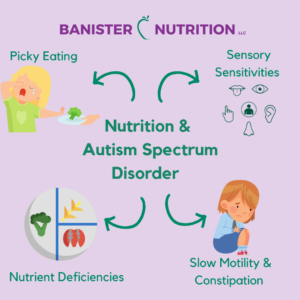The Connection Between Autism Spectrum Disorder and Nutrition
 Autism Spectrum Disorder (ASD) is a neurological condition that includes a broad range of characteristics that affect how individuals interact socially, communicate, learn, and behave.
Autism Spectrum Disorder (ASD) is a neurological condition that includes a broad range of characteristics that affect how individuals interact socially, communicate, learn, and behave.
While a focus on nutrition can be beneficial for all individuals, why would one want to specifically focus on eating and eating behaviors when they or someone they love have an autism spectrum disorder diagnosis?
- ASD is characterized by slow motility and constipation. While there may be other gastrointestinal issues found with ASD, these two are the most common. They are characterized by early fullness, painful bowel movements, and infrequent bowel movements. A registered dietitian can assist individuals with ASD in increasing water or water-rich foods in their diet, increasing low intensity movement, and adding more fiber rich foods.
- ASD is associated with sensory sensitivities including food texture preferences along with food texture aversions. This also means the environment in which an individual with ASD is eating may be an important factor in their overall eating experience.
- Picky eating is a common struggle with ASD. This could be related to food texture preferences but it could also be related to other sensory sensitivities, digestive discomfort, or a resistance to change. ARFID is also a form of picky eating that is linked with ASD. One study showed 35% of pediatrics diagnosed with ASD also met ARFID diagnoses criteria as well. [1] ARFID stands for Avoidant/Restrictive Food intake. Similar to picky eating, ARFID is characterized by a limited variety of foods one is willing to eat or like. Unlike picky eating, this list of foods tends to get smaller over time and may be an adverse reaction to a negative experience such as choking or vomiting. This disorder can lead to fatigue, difficulty sleeping, nutrient deficiencies, growth stunts, constipation, and failure to thrive.
- A connection has been found between ASD and nutrient deficiencies. This could be related to picky eating, texture sensitivities, and/or methylation abnormalities. A dietitian can help identify and address nutrient gaps!
[1] Williams K, Hendy H, Field D, Belousov Y, Riegel K, Adams W. Implications of avoidant/restrictive food intake disorder (ARFID) on children with feeding problems. Child Health Care 2015; 44: 307–21.



